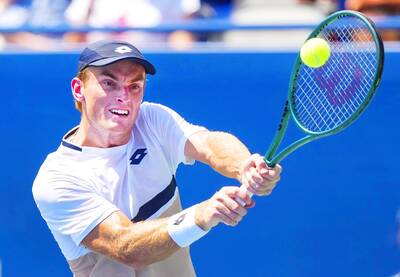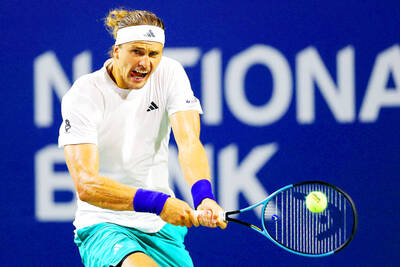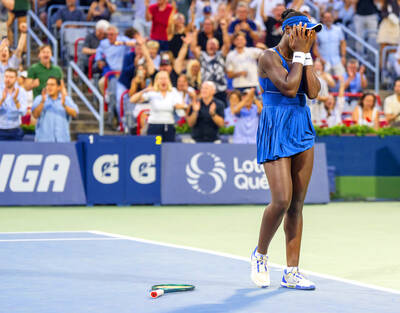“I just blew my mind,” Usain Bolt said, trying to put his achievements into words. “I blew the world’s mind.”
It was classic Bolt, the entertainer who dances as well as runs for the crowd and deadpans the one-liners. He did blow the world’s mind, but who else would dare say such a thing? Over the past week some have found him cocky and immodest, but consider the facts of Bolt’s achievements.
At his first Olympic Games, Bolt became the first man in history to win three gold medals and set three world records in the 100m, 200m and 4x100m relay. And how. When Bolt broke Michael Johnson’s 12-year-old 200m record of 19.32 seconds, by 0.02 seconds he was running at an average speed of 37.305kph, covering an incredible 10.3m per second.
Five days earlier, the then 21-year-old seemed to jog through the 100m, brazenly slowing down for the final 10m, arms out, hardly out of breath, lowering his own world record to 9.69 seconds. Then last Friday he completed the hat-trick, helping his team to another Jamaican gold medal and breaking the 4x100m relay world record held by the US team for eight years.
Every Jamaican medalist has subsequently hailed Bolt as their inspiration — their own successes labeled “the Bolt effect.” Jamaican Prime Minister Bruce Golding called to tell him that back home the country was road-blocked. In Kingston’s Mandela Park huge screens were set up to watch the athletics and from morning to night, at each of Bolt’s victories, people partied in the streets in celebration.
Since breaking Asafa Powell’s 100m world record in May — having only run that distance at a senior level on four previous occasions — Bolt has gone from being just another Jamaican sprinter to possibly one of the greatest athletes of all time. Within days of his first triumph it was possible to buy Usain Bolt watches, stamps and T-shirts.
It is a steep trajectory that brings with it global recognition as well as scrutiny. How is it possible to run so fast? Faster than any convicted drug cheat. In the same breath, people ask why the Jamaican team have been more successful than ever — there are more medals than there are Jamaican journalists covering the Games.
Bolt understands the suggestion and is patient with his answers.
“We’ve been tested a lot,” he said last Saturday. “I was tested four times before I even started running, urine and blood tests. I’ve been tested so many times now I’ve lost track. I have no problem with that, we work hard and we’re clean and anytime they want to test us it’s fine.”
It is an accusation that all Jamaicans involved in athletics have been defending against. Asafa Powell’s coach, Stephen Francis, who first saw Bolt run as a 13-year-old at the Jamaican National Schools Championships dismissed the question.
“It’s not explainable how they do what they do. It doesn’t mean he’s cheating, he’s just using what he has. Usain ran 19.9 [seconds] aged 17, when he was a skinny kid. Look at him now, 19.3 [seconds] is not that surprising. I can’t stop people doubting,” Francis said. “People always have a way of belittling or trying to explain things they can’t understand by saying, ‘Yeah, Usain Bolt, he’s cheating, he’s not real.’ But in the world people come along who are exceptional. You have Einstein, you have Isaac Newton, you have Beethoven — you have Usain Bolt.”
Bolt was born to parents Wellesley and Jennifer in Trelawny Parish on the north coast of Jamaica. A rural area, known historically for its high number of sugar plantations and a large Maroon population, its more recent claim to fame is producing world-class athletes, such as Ben Johnson and Veronica Campbell-Brown. What is so special about Trelawny? Wellesley Bolt puts it down to the distinctive yellow yams of the area that make up his son’s breakfast, along with a starchy combo of dumplings and green banana.
At William Knibb Memorial High School, Bolt was identified as a naturally gifted athlete. Dwight Barnett, one of Bolt’s PE teachers, described the young Bolt’s talent as head-scratching.
“Sometimes I’d look at that stopwatch and think, ‘There’s something wrong with this watch. No kid can run that quickly,’” Barnett said.
But Bolt’s first true love was cricket, not athletics. Even now he lights up at the mention of Chris Gayle and Freddie Flintoff.
“I love the aggressive players,” he said.
When he goes back to Jamaica he plays cricket in the local parks. Pablo McNeil, Bolt’s first coach — a former Olympic sprinter — recalled the challenge of getting him on to the running track.
“The first time I saw Usain bowling I knew he was a born sprinter, he was so fast,” he said. “But he was so cricket-mad that he took a bit of persuading.”
McNeil frames Bolt’s achievements in the context of the great Jamaican athletes that came before him.
“No Jamaican sportsman has ever had as much pressure on him. Not Herb McKenley, not George Rhoden, not Arthur Wint, not Don Quarrie, no one. You have no idea how hard that is. He’s going to be the greatest sprinter this world has ever seen. In fact, he might be already,” McNeil said.
Germaine Mason, the British high jumper and silver medalist in Beijing who switched nationality from Jamaica in 2006, has been friends with Bolt since their junior days.
“I remember him at the junior world championships,” Mason said. “He had three medals clinking around his neck when anyone else was lucky just to have one. There he was walking along, joking with everybody, clink clink clink.”
Suddenly everything Bolt touched turned to gold. After the 100m in Beijing, Powell and Gay were out of the picture. Bolt became “Lightning Bolt” and everybody wanted to talk to him. Delighted and delirious, Bolt celebrated as a young man, dancing and entertaining the crowd. Jacques Rogge, the International Olympic Committee president, was not impressed and swiftly labeled Bolt’s antics as disrespectful to his competitors. But the man that Rogge and others describe is unrecognizable to those who know Bolt well.
“Usain is very humble off the track,” Mason said. “He’s not like what you see on the TV. I disagree with what Jacques Rogge said. When you win an Olympic medal that’s the greatest thing ever, you don’t just want to win and walk off the track, you want to entertain the crowd. You want to open up and express how you’re feeling. His celebrations are a very good thing for the sport.”

TAIWANESE EXITS: Fellow Australian Christopher O’Connell joined Tristan Schoolkate as a winner following his 6-1, 6-2 defeat of Tseng Hsin-chun Australian qualifier Tristan Schoolkate on Monday dispatched rising Brazilian talent Joao Fonseca 7-6 (7/5), 6-4 at the ATP Toronto Masters, ensuring a breakthrough into the world top 100. The 24-year-old from Perth moved to 98th in the ongoing live rankings as he claimed his biggest career victory by knocking out the ATP NextGen champion from November last year. Schoolkate, son of a tennis coach, won his first match over a top-50 opponent on his sixth attempt as he ousted the world No. 49 teenager from Brazil. The qualifier played a quarter-final this month in Los Cabos and won through qualifying for his

Top seeds Alexander Zverev of Germany and American Coco Gauff on Tuesday advanced to the third round of the Canadian Open after both players were pushed hard by their opponents. World No. 3 Zverev, playing in his first match since his first-round loss at Wimbledon, was far from his best, but emerged with a 7-6 (8/6), 6-4 win over Adam Walton under the lights in Toronto. Momentum shifted firmly in Zverev’s favor when he won a 52-shot rally in the first set tiebreak and he sealed the win on a double fault by the Australian in the second set. “It was a very

Canadian teenager Victoria Mboko upset top-seeded Coco Gauff 6-1, 6-4 on Saturday night to reach the National Bank Open quarter-finals. “Your support was incredible,” Mboko told the crowd in French after a chorus of “Ole, Ole, Ole” chants echoed around the venue. “I’m really happy to win today ... It’s incredible. I’m so happy to beat such a great champion.” Gauff dropped to 2-3 since winning the French Open. She followed the major victory with opening losses in Berlin and Wimbledon, then overcame double-fault problems to win two three-set matches in Montreal. Gauff had five double-faults on Saturday after having 23 in

Formula 1 champion Max Verstappen on Thursday said that he is staying with the Red Bull team next year, ending months of speculation over his future. “Some people just like to stir the pot, some people just like to create drama, but, for me, it’s always been quite clear, and also for next year,” the four-time champion said ahead of the Hungarian Grand Prix. “I’m discussing with the team already the plans — the things that we want to change for next year, so that means that I’m also staying with the team for next year,” he said. Verstappen has a contract with